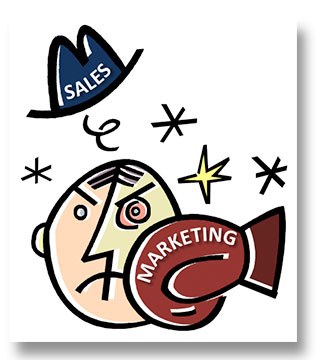 Have you noticed how sales people and marketing people often don’t get along? Each camp complains that the other guys are creating needless work for them, undermining their efforts, don’t understand their value to the company, etc., etc., etc. Why can’t they see that they should work together to achieve their common goal of making their company successful and profitable? The battle rages on, judging by a conversation I recently had with my husband. Mike is a former technical marketing engineer who now works for a large software company. He’s an expert in securing virtual environments in the cloud and he delivers a lot of presentations on the subject. We spoke about a problem he’s having creating PowerPoint presentations that both he and the sales engineers can use.
Have you noticed how sales people and marketing people often don’t get along? Each camp complains that the other guys are creating needless work for them, undermining their efforts, don’t understand their value to the company, etc., etc., etc. Why can’t they see that they should work together to achieve their common goal of making their company successful and profitable? The battle rages on, judging by a conversation I recently had with my husband. Mike is a former technical marketing engineer who now works for a large software company. He’s an expert in securing virtual environments in the cloud and he delivers a lot of presentations on the subject. We spoke about a problem he’s having creating PowerPoint presentations that both he and the sales engineers can use.
Mike: The sales engineers don’t like the kind of presentations I deliver for keynotes, the kind with big pictures and only a little bit of text. They want super-detailed slides they can read from.
Me: If anything, it should be the other way around. If you’re delivering a keynote to a roomful of your company’s fans, then you can get as technical as you want. But the sales people have to convince nontechnical people to sign on the dotted line, so they shouldn’t be presenting with boring, wordy slides. They’re dealing with a bunch of guys with their arms crossed who don’t want to spend money.
Mike: Actually, most of the time they’re invited to pitch.
Me: So you’re saying that sales engineers can’t take the time to learn about the products even though they have been asked by prospective clients to present to them.
Mike: Yup.
Me: That is a problem. They should know more about the products so that they don’t have to read off the slides.
Mike: Yeah, but each SE is in charge of twenty or thirty products. They can’t know everything about everything we sell.
Me: Sounds like they need more training.
Mike: There’s a boatload of information available to them online, but they don’t use it. They’ll call me up a day or two in advance and tell me they need a presentation because they have a sales meeting coming up. They want something they can read to the prospect.
Me: What!?! That’s ridiculous! Why can’t you train them with a webcast? Or create a narrated sample presentation that they could study?
Mike: If I did that, they’d complain to their bosses that I’m being unreasonable. Since they’re the ones generating income, they usually get what they want.
Me: Well, if they won’t accept training and don’t like your presentation style you’ll have to create two presentations: one for you and one for them.
Mike: Crap.
Why are we fighting?
A lot of times people in sales disagree with what marketing asks them to do. Sales people want to close deals. They’re out there hustling their butts off, trying to meet as many clients as they can to make as many sales as they can. The marketing department, on the other hand, has the luxury of working behind the scenes far from the pressures of client contact. They take time to craft messages, to conduct tests, to figure out what works and what doesn’t. Then they ask sales people to change their behavior in the hopes of getting better results.
Why don’t people understand that when they work for the same company, they strive to achieve the same goals: making the company successful and profitable? Sales and marketing people both want to earn paychecks and to remain employed. It’s not as if marketing is throwing all of these crazy ideas at sales just to make their lives more difficult. If anything, they’re trying to make the salespeople more effective. But while sales people want to be effective, they’re under a lot of pressure to turn leads into clients.
Making the time to prepare
Why are the sales people asking for materials only a day or two before their presentations? I can’t imagine winging a sales pitch, especially one that’s potentially worth thousands of dollars.
I used to work for a management consulting firm. Every proposal we created took at least a week to write and would make the rounds in the office again and again until it was as perfect as it could be. Why? Because each deal was worth anywhere from $25,000–50,000 and management wanted these pitches to be rock solid. If we got the contract, then the materials for each project would be created and edited over the course of a couple of weeks. We never prepared materials the day before a presentation. As a result, the company was very successful.
Mike told me that sales people constantly ask for PowerPoint presentations they can read to their prospects. During the meeting, everyone is looking at the same laptop while the sales person makes his pitch, so he can’t refer to the Speaker Notes. This means that the sales person is learning about the product at the same time as the prospect. Unbelievable.
Studies have shown that people’s number-one complaint about presenters is when they read off the slides. So why do presenters keep doing it?
It’s hard to give up highly detailed diagrams and densely worded slides in favor of memorizing your presentations and knowing your products inside and out. It takes a while, and I totally get that sales people don’t have a ton of free time. But isn’t it better to be seen as a knowledgeable expert than as a slick sales person who only knows what he reads?
What kind of presentation would work for both a keynote and a sales pitch?
With the sales camp so firmly entrenched in the old style of slides that cause Death by PowerPoint and marketing urging a more refined, studied approach there really is no middle ground. I couldn’t see any way around making two presentations, but it really irked me to have to say it.
Overall, it was one of the most frustrating conversations I’ve had in a long time. Mike and I both agree that sales people could be doing a lot better by changing their approach to presenting, but they’d rather maintain the status quo. And without direction from the top down, I don’t see their attitude changing anytime soon.
Your turn
Have you ever been in a similar situation? Is there a marketing vs. sales attitude where you work? How do you deal with it?
